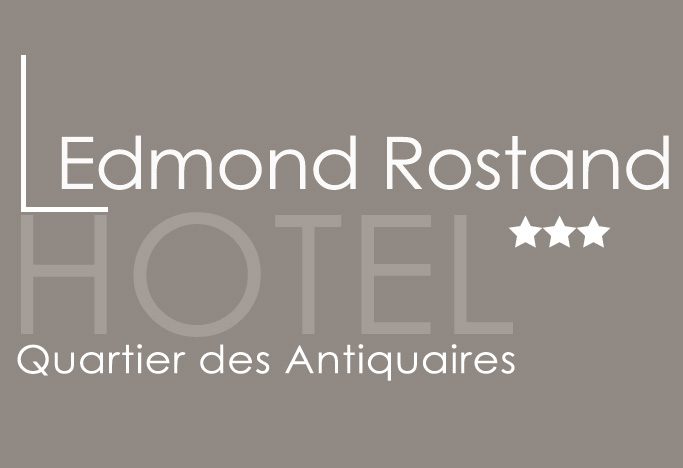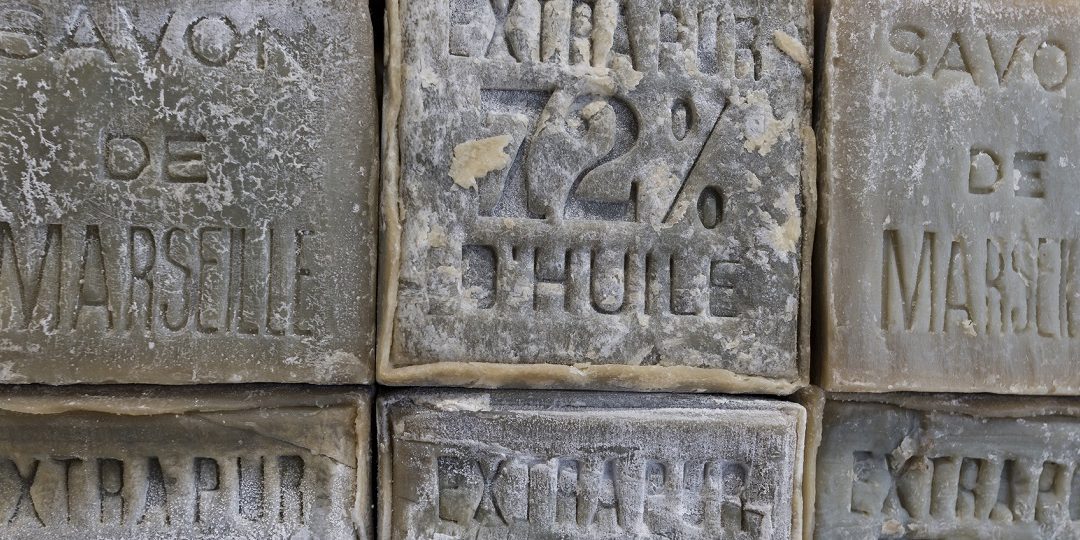Marseille soap Heritage of Marseille
The traditional Marseille soap is the result of a real French know-how. In its liquid or solid form, for skin hygiene or cleaning, this versatile soap has been part of many French households for generations now.
However, since the name “Marseille soap” is not protected, it is necessary to be cautious when choosing it. Indeed, it is necessary to make sure that the composition of the chosen Marseille soap is genuine and that its creation process respects specific successive steps. Thus, Marseille soap is 100% natural, pure and authentic a nedd a visit in Marseille.
But then, what exactly is a Marseille soap ? What is its history ? How to recognize real Marseille soap ? What is the composition of Marseille soap ? What are the steps to create it ?
To know everything about the famous and traditional Marseille soap, read on if you want to bring back a souvenir from Marseille !
What is Marseille soap ?
The composition of Marseille soap, rich in olive oil, makes it an ideal soft multi-purpose soap. It is used for personal hygiene for the whole family, for house cleaning and for cleaning clothes.
Some people even use it as a raw material to make their own DIY (do it yourself) laundry detergent or as a washing base in its liquid soap form to create their homemade shower gel.
The use of real Marseille soap is suitable for all skin types, even the most sensitive.
What is the history of Marseille soap ?
Although it is commonly believed that Marseille soap originated in the French city of the same name, the composition of traditional Marseille soap dates back to antiquity. Indeed, written records show that the Egyptians already knew the recipe but in liquid form. In Europe, the first hard bar soap was created by the Gauls.
However, it remains true that the manufacture of Marseille soap, in a real soap factory, was developed and democratised in the Middle Ages throughout the Mediterranean basin and particularly in the city of Marseille.
The composition of Marseille soap is inspired by the famous Syrian soap, Aleppo soap, which is composed, among other things, of olive oil and bay laurel oil.
During the Renaissance, an edict called the “Edict of Colbert” regulated the manufacture and know-how of this renowned soap. Thus, it ensures that the composition of Marseille soap contains local products such as olive oil from Provence as well as soda and salt from the Camargue. The addition of animal fats in the composition of Marseille soap is forbidden, so that it remains pure and mild.
At the beginning of the 18th century, a label appeared as a guarantee of quality: “Extra pure 72% oils”, which ensured that Marseille soap was composed of 72% vegetable oils. Nevertheless, the only oil included in the composition of authentic Marseille soap remains olive oil.
Today, as the natural way of doing things is gaining in popularity, interest in this ancestral French “zero waste” soap is growing. The traditional soap factories of Marseille continue their local productions which arouse great interest.
How to recognize a real Marseille soap ?
The official Marseille soap is recognizable thanks to its cubic shape, whose six sides are stamped, they testify of its authenticity. Among the inscriptions, we find the composition of the Marseille soap, its name, its weight or the name of the soap factory which produced it.
The composition of Marseille soap based on olive oil attests to its quality. Its beautiful intense green colour and its characteristic strong smell are also proof of its authenticity.
However, to this day, master soap makers sometimes make Marseille soaps in different forms (soap bars, figures…), the cube remains the most widespread, well-known and sought-after form.
What is the composition of Marseille soap ?
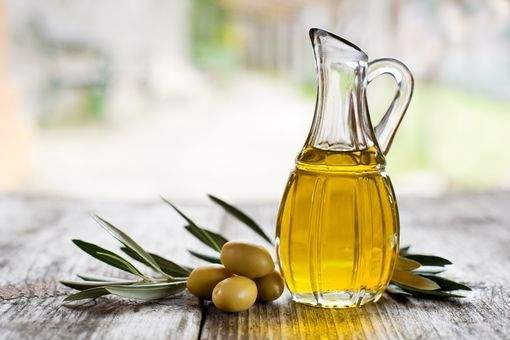
Olive Oil
The composition of Marseille soap and the stages of its manufacture are not protected by law. Thus, a soap can legally be said to be from Marseille, without having been made in a Marseille soap factory. Moreover, the composition of Marseille soap may vary and not follow the official recipe. Therefore, it is important to remain vigilant and to pay attention to the quality of the product selected.
By reading the list of ingredients, the INCI list (International Nomenclature of Cosmetic Ingredients), located on the product’s packaging, it is easy to verify the composition of the Marseille soap chosen.
Thus, the composition of the Marseille soap must include :
- 72% vegetable oils, traditionally olive oil. After saponification, it is called “sodium olivate” in the list of ingredients.
- Water “aqua”,
- Vegetable glycerine ‘glycerin’,
- Salt “sodium chloride”,
- Sodium hydroxide in small traces, which makes saponification possible.
Can there be other vegetable oils in the composition of Marseille soap ?
To date, vegetable oils such as coconut oil (“sodium hydrogenated cocoate” or “sodium cocoate”), derived from the coconut, and/or palm oil (“sodium palmate” or “sodium palm kernelate”) can be added to the composition of Marseille soap, and this voluntarily, even by soap factories located in the mother city, which claim to be traditional. It is said that copra oil adds foaming power to the soap cube and that palm oil gives it a suitable consistency.
However, to obtain a quality Marseille soap, these vegetable oils are not necessary; olive oil is more than sufficient. These vegetable oils are less expensive than good quality olive oil, which is the main reason why they are added to the composition of Marseille soap, the manufacturing cost is then lower.
Moreover, the composition of Marseille soap must be free of any other vegetable oil than olive oil, in order to guarantee a truly authentic soap.
What is the composition of organic Marseille soap ?
The composition of organic Marseille soap is similar to that of a classic Marseille soap. However, the raw materials, especially the olive oil, are organically grown, which ensures the natural origin of the substances. Moreover, an organic soap preserves the skin tissue, as well as the body as a whole, from undesirable chemical molecules that can potentially be found in a classic Marseille soap.
How is real Marseille soap made ?
For Marseille soap to be authentic, it must be made in Marseille, in a cauldron, in a soap factory that follows a 5-step process:
- Mashing: the ingredients are mixed in a tank and boiled. A liquid soap in the form of a paste results from a specific saponification process and successive natural chemical reactions.
- Boiling: the paste is then boiled in a cauldron for about 4 hours. The paste is then washed by spraying cold water over its surface, a process that takes a few days. Surprising as it may seem, the master soap maker puts a drop of Marseille soap on his tongue to know if the paste is ready. If it is, the fire is turned off and the paste rests for 36 hours, if not, the paste continues to cook.
- Pouring into the bins: the soap paste is released from the cauldron and poured into bins so that it hardens slowly, for 48 hours, in the form of imposing blocks.
- Cutting: this is where the traditional cubes are created, thanks to a meticulous mechanical cutting with steel wire.
Drying: once the cubes have been cut, they dry for 15 days on wooden trolleys called “cayette”. - Stamping: the final stage is the printing of inscriptions on all sides of the soap (name, percentage of olive oil, weight…). They are then packaged and can be exported and marketed.
Moreover, the composition of Marseille soap must contain good quality olive oil and be free of preservatives, perfumes, colorants and animal fats.
How to choose your Marseille soap ?
The composition of the Marseille soap and the manufacturing process are key points to access an authentic soap.
Beware, coloured soaps often available on the market or, on the contrary, white soaps, are not real Marseille soaps. Indeed, their shimmering colours show the presence of dyes in their composition which are potentially problematic for the skin and the body. In addition, they often have strong smelling perfumes obtained with the help of artificial fragrances.
As for white Marseille soap, it is not made of olive oil but, generally, of palm oil and/or coconut oil.
Traditional Marseille soap has a green colour, more or less dark depending on the olive oil used, and a raw, full-bodied and typical olive oil smell.
Is the composition of Marseille soap the same when the soap is solid or liquid ?
In order to meet different daily needs (stain removal, shower gel, dishwashing…), Marseille soap can be presented in solid or liquid form.
To stabilize a liquid soap, it is not exactly the same saponification and manufacturing process that is used. Beware, the composition of liquid Marseille soap includes olive oil but other ingredients are sometimes added such as, among others, a stabilizer and preservative named by the acronym ” EDTA “, ” Disodium EDTA ” or ” Dipotassium EDTA ” in the INCI list.
To avoid undesirable chemical molecules, it is important to select a liquid soap of natural origin and to take a look at the INCI list in order to check the components of the product.
What are the alternatives to Marseille soap for personal hygiene ?
Although its use is totally adapted to skin hygiene, the composition of Marseille soap based on olive oil gives it a singular, characterful and intense smell that does not please everyone.
Different alternative soaps exist, this list is not exhaustive:
Solid cold process soap (S.A.F)
A cold process soap can completely replace a raw Marseille soap or a traditional shower gel, it is gentle and respects all skin types. It is composed of good quality vegetable oils and butters (shea butter, etc.) and the soap is saponified without heat in order to preserve all the virtues of these fats for the skin. They are enriched with vegetable oils.
Aleppo soap
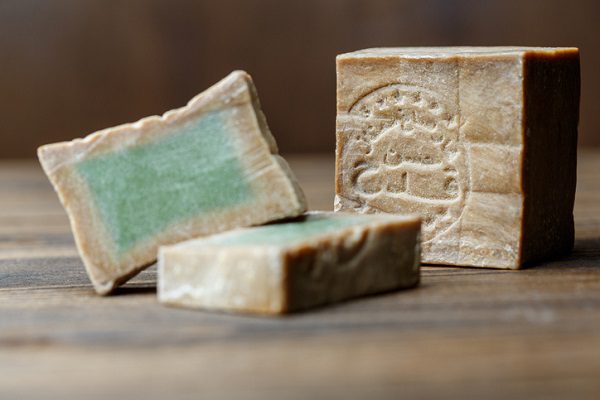
Aleppo soap
Aleppo soap resembles the composition of Marseille soap, it is an association between olive oil and laurel. Its smell remains characteristic and raw. However, Marseille soap is still a local product that should be favoured as part of an eco-responsible approach.
Liquid Marseille soap
To peacefully transition to a healthier body hygiene routine, it is possible to enjoy Marseille soap in its liquid form.
La Vie Naturelle offers a 100% natural liquid Marseille soap shower gel with lavandin (Lavandula latifolia) and lavender (Lavandula angustifolia) essential oils that is suitable for use as a shower gel, for example. The essential oil brings a pleasant and subtle smell, it softens the original smell of cubic Marseille soap.
Visitez une savonnerie de Marseille
The Marseille Soap Museum
Museum
25 Quai de Rive Neuve
Closes 6PM · 04 96 12 00 91
“Then check out their soap factory.”
WEBSITE
Marseillaise soap Unicorn
Manufacturer
26 Quai de Rive Neuve
Open ⋅ Closes 8PM · 04 91 59 43 58
“Good price compared to other store…”
Soap The Serail
Manufacturer
50 Bd Anatole de la Forge
Open ⋅ Closes 12PM · 04 91 98 28 25
“This is the last traditional soap factory in Marseille.”
WEBSITE
Savonnerie Fer à Cheval
Cosmetic products manufacturer
66 Chem. de Sainte-Marthe
Closes 6PM · 04 91 10 30 80
WEBSITE
Savonnerie du Midi
Manufacturer
72 Rue Augustin Roux
04 91 60 54 04
WEBSITE
Savonnerie Marseillaise de la Licorne
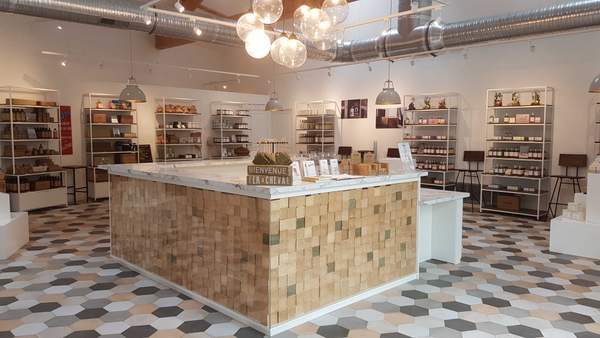
Old Marseille soap factory
Toiletries store
34 Cr Julien
Closes 7PM · 04 96 12 00 91
“Informative (free!) tour of the soap manufacturing process.”
Marius Fabre soap factory
Manufacturer
Salon-de-Provence
04 90 53 24 77
“very pleasant visit with a shop that sells Marseilles soap”
WEBSITE
Prepare your stay in Marseille
Marseille soap: the final word !
Genuine Marseille soap remains a versatile alternative to a classic shower gel. If it is authentic, the composition of Marseille soap is ideal for carefully cleaning all types of skin, even the most fragile.
Thanks to its minimalist packaging, it is both skin and planet friendly; its reputation is well established. Indeed, it is a low-cost, local, economical and ecological product with great adaptability. It is also highly effective on laundry stains, even on delicate textiles.
Whether it is sold as a traditional bar, as flakes to create laundry and dishwashing liquid or as liquid soap, Marseille soap has been a staple in French homes for centuries now.
